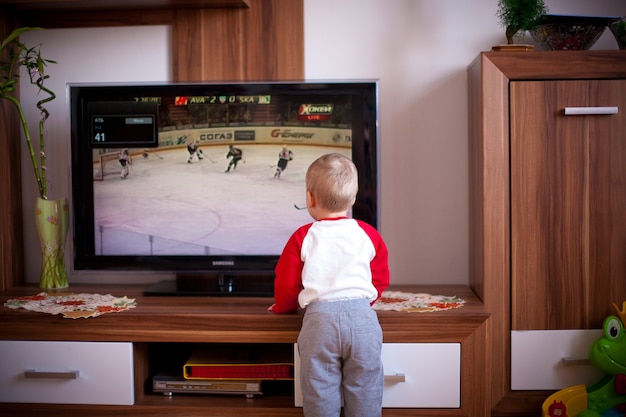Screens and babies

The screens (television, computer, tablet and smartphone) are now part of everyday life for most families. While entertaining and practical in some situations, screens can have many disadvantages for children's health and development. This is why it is not recommended that babies be exposed unless it is to communicate using a video chat application.

In North America and Europe, several public health departments and pediatric associations have made recommendations regarding the exposure of toddlers to screens. the Canadian Pediatric Society, the Canadian Sedentary Behavior Guidelines and the Montreal Public Health Directorate agree that before 2 years, ideally, a toddler should not be exposed to television or any other screen. In the United States, the American Academy of Pediatrics (AAP) indicates that children 18 months old and under should not be exposed to screens unless it is to use a video chat application.

Much research has focused on the role of television in the development of toddlers. Most concluded that television is not necessarily beneficial to the development of young children. Some educational programs could, however, have a positive effect on their development. Research also suggests that a child's interactions with those around him and his environment are the best source of stimulation for him. However, the more time a child spends in front of a screen during a day, the less they will have to play and interact with others. It has even been shown that the constant background noise of the TV left on while no one is watching would harm the child's learning.

Too much exposure to screens decreases the amount of time children spend moving on a daily basis. Indeed, the use of screens is often at the expense of physical activity and free play. Children 4 to 6 years old who spend more than 2 hours a day in front of a screen would play 30 minutes less outdoors than others of their age. In addition, spending several hours a day in front of a screen would be linked to an increased risk of overweight and obesity. A sedentary lifestyle and lack of physical activity may also affect the development of motor skills such as walking, running, throwing, jumping, crawling, etc. These motor skills are essential to the overall development of the child.

Some experts believe that the tablet could be a more interesting learning tool than television because of its interactivity provided. It's used sparingly and not used as a TV to watch a program or movie.
source : http://naitreetgrandir.com

The screens (television, computer, tablet and smartphone) are now part of everyday life for most families. While entertaining and practical in some situations, screens can have many disadvantages for children's health and development. This is why it is not recommended that babies be exposed unless it is to communicate using a video chat application.
No screen before 2 years

In North America and Europe, several public health departments and pediatric associations have made recommendations regarding the exposure of toddlers to screens. the Canadian Pediatric Society, the Canadian Sedentary Behavior Guidelines and the Montreal Public Health Directorate agree that before 2 years, ideally, a toddler should not be exposed to television or any other screen. In the United States, the American Academy of Pediatrics (AAP) indicates that children 18 months old and under should not be exposed to screens unless it is to use a video chat application.
The role of screens in the development of children

Much research has focused on the role of television in the development of toddlers. Most concluded that television is not necessarily beneficial to the development of young children. Some educational programs could, however, have a positive effect on their development. Research also suggests that a child's interactions with those around him and his environment are the best source of stimulation for him. However, the more time a child spends in front of a screen during a day, the less they will have to play and interact with others. It has even been shown that the constant background noise of the TV left on while no one is watching would harm the child's learning.
Physical Fitness and Motor Skills

Too much exposure to screens decreases the amount of time children spend moving on a daily basis. Indeed, the use of screens is often at the expense of physical activity and free play. Children 4 to 6 years old who spend more than 2 hours a day in front of a screen would play 30 minutes less outdoors than others of their age. In addition, spending several hours a day in front of a screen would be linked to an increased risk of overweight and obesity. A sedentary lifestyle and lack of physical activity may also affect the development of motor skills such as walking, running, throwing, jumping, crawling, etc. These motor skills are essential to the overall development of the child.
Other effects on development
According to several studies, too much exposure to small screens could also harm:- language development;
- the quality of sleep;
- to the attention;
- behavior (aggressiveness, passivity, self-esteem);
- to academic success; to health in general (besides obesity and overweight: fatigue, headaches, posture problems, poor diet, high blood pressure, type 2 diabetes, long-term cardiovascular problems, etc.
And the tablet?

Some experts believe that the tablet could be a more interesting learning tool than television because of its interactivity provided. It's used sparingly and not used as a TV to watch a program or movie.
Adult programming
Many parents think that young children do not understand adult programming (eg, TVShows, Reality tv and the news...). However, more and more studies show that the content of these programs can leave a strong impression on toddlers. It is better not to let your child watch adult programming. If, however, your child should be exposed to this type of programming, it is always better for an adult to be present to discuss with the child what he sees on the screen and to be able to answer his questions.source : http://naitreetgrandir.com
Commentaires
Enregistrer un commentaire